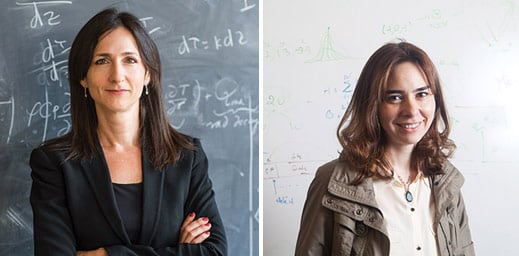Two MIT professors—computer scientist Dina Katabi and astrophysicist Sara Seager—were among 24 recipients nationwide of 2013 MacArthur Fellowships, sometimes called “genius grants.”

Katabi, a professor of computer science and engineering, works at the intersection of computer science, electrical engineering, and physics to improve the speed, reliability, and security of data exchange. “That intersection can enable new things that we couldn’t have thought of if we just focused on one of those things alone,” she says. “How can you rethink your mobile applications if you have information about how the signal is going to propagate over the air and the wireless medium? How can you design your signals differently if you know what the application wants?”
The MacArthur Foundation cited Katabi, 42, for her “ability to translate long-recognized theoretical advances into practical solutions that could be deployed in the real world.” Through her numerous contributions, it said, she “has become a leader in accelerating our capacity to communicate high volumes of information securely without restricting mobility.”
Katabi’s research has provided solutions for a range of networking issues—from protocols to minimize congestion in high-bandwidth networks to algorithms for spectrum analysis.
Katabi directs the MIT Center for Wireless Networks and Mobile Computing and leads the Networks at MIT group at CSAIL.
Seager, a professor of physics and planetary science, explores the possibility of life elsewhere in the galaxy. She has adapted the principles of planetary science to the study of exoplanets—planets outside our own solar system. The MacArthur Foundation cited Seager, 42, for “quickly advancing a subfield initially viewed with skepticism by the scientific community.” The existence of exoplanets was “a mere hypothesis until the mid-1990s,” the foundation explained, but “nearly 900 exoplanets in more than 600 planetary systems have since been identified, with thousands of more planet candidates known.”
It took two tries to deliver the good news to Seager. “The first call did not get through because, as the foundation put it, my ‘very professional and protective assistant’ screens my calls for anything unusual, as I try to avoid calls about UFOs and aliens,” she recalls. “This one sounded like a UFO call at first.”
“As a single—widowed—mother, I will use all of the grant money on the home front so my own brain can be free to think creatively and I can preserve quality time with my children,” she says.
Seager, who joined the MIT faculty in 2006, is the author of Exoplanet Atmospheres and Exoplanets, both published in 2010.
Keep Reading
Most Popular
Large language models can do jaw-dropping things. But nobody knows exactly why.
And that's a problem. Figuring it out is one of the biggest scientific puzzles of our time and a crucial step towards controlling more powerful future models.
The problem with plug-in hybrids? Their drivers.
Plug-in hybrids are often sold as a transition to EVs, but new data from Europe shows we’re still underestimating the emissions they produce.
Google DeepMind’s new generative model makes Super Mario–like games from scratch
Genie learns how to control games by watching hours and hours of video. It could help train next-gen robots too.
How scientists traced a mysterious covid case back to six toilets
When wastewater surveillance turns into a hunt for a single infected individual, the ethics get tricky.
Stay connected
Get the latest updates from
MIT Technology Review
Discover special offers, top stories, upcoming events, and more.